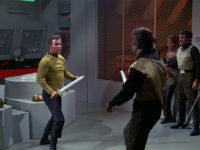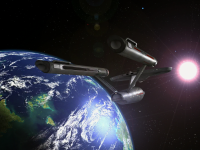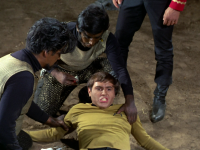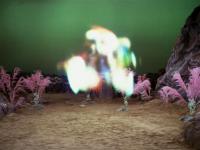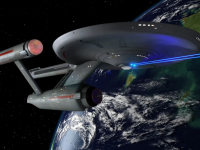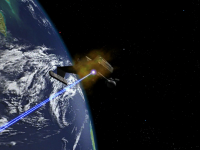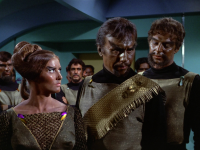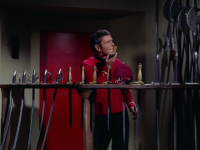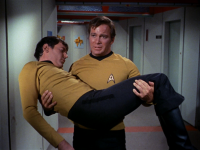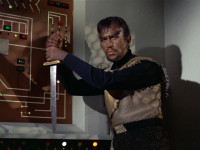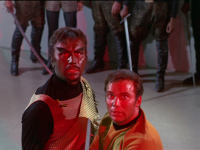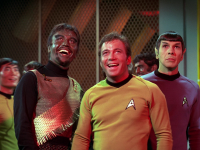Star Trek: The Original Series — 3x07 — Day of the Dove
Synopsis
A malevolent entity pits Klingons against the Enterprise crew.
Filler rating: partial filler
Kang's character will recur in DS9: Blood Oath and Voy: Flashback. However, it isn't absolutely essential to watch this episode first in order to fully get his character in those later appearances.
Remarkable scenes
- Chekov's outburst against Kang for having killed his brother.
- Scotty freezing the Klingons in the transporter buffer.
- McCoy and Chekov expressing unrestrained bias and hatred toward the Klingons.
- The Enterprise destroying the Klingon ship.
- The sword fight between the Klingons and the Enterprise crewmen.
- Sulu claiming Chekov is an only child and that his "brother" was fictional.
- Kirk: "What about the armory?" Scotty: "I'm in there now, sir. And you've never seen such a fine collection of antiques in your life!" The camera pans out and a massive sword collection is displayed.
- McCoy freaking out about Kirk and Spock planning a truce.
- Kirk and Spock discovering the alien entity.
- Scotty, Spock and Kirk freaking out too.
- Kirk trying to convince Kang's wife to team up against the entity.
- Kirk, goading Kang to stab him: "In the heart, in the head, I won't stay dead!"
- Kirk and Kang calling a truce, thus robbing the entity of its power over them.
Review
A great idea for an episode with only a few flaws. The central success of the story is pitting the Klingons and the Federation against a common enemy. A similar theme is hinted at in Errand of Mercy when Kor briefly proposes to Kirk that they work together to defeat the Organians, but this episode takes that idea and crafts an entire story out of it; quite a good one at that.
Aside from simple pleasures like watching Kirk outmaneuver the Klingons using the transporter buffer and taking in the ridiculousness of sword fights on a starship (Sulu always seems to find a sword to go rampaging with, doesn't he?), the story has some measures of intelligence and depth as well. I was particularly fond of the hints of propaganda influencing bias of both sides against the other and I was fond of the characterization of Kang's wife in that she would not trust Kirk until he proved by not executing her that not everything she believes about the Federation is true. Likewise, the moment Kirk and Spock both briefly questioned whether their own judgement could be trusted due to the entity's mind-altering nature was a nice touch.
The biggest flaw in the story, not unlike so many other Star Trek episodes, is that it takes them all so long to figure out that the entity is responsible for their conflict. The climax of absurdity here is the moment when swords start appearing in the rec room and nobody questions it at all. Everyone just picks up a sword and starts fighting. Even after the Klingons have a moment to reflect on that event, they don't bother to question their good fortune. They just keep plotting against the Enterprise crew seemingly oblivious to the fact that something was terribly wrong.
But it wasn't just the Klingons who were slow on the uptake there. Not long after that scene, Kirk starts rattling off a hypothesis about how the Klingons could have transformed ordinary objects into weapons. Spock quickly brings some sanity back to the discussion by pointing out that it's ridiculous to assume that the Klingons could have done that. One of my favorite lines was when Spock said "if they had such power, would they not have used it to create more effective weapons and only for themselves?" Thanks Spock for stating the obvious. Apparently Kirk needed to be slapped around with elementary logic today.
There are a few other smaller groan-worthy details in the story too. Scenes when characters talk to the computer are almost always annoying and Spock's conversation with the computer analyzing the entity in its shrill, monotone voice and drawing obvious conclusions was no exception. Kirk also had a few choice awkward lines in this episode too, such as telling Kang to "go to the devil" and declaring (sarcastically?) that it's "stardate armageddon" at one point.
Though this sort of awkwardness is not uncommon for Star Trek by this point and it's easily forgiven. With more polish, better plotting, a faster pace, and perhaps a more compelling common enemy for the Federation and the Klingons to engage, this episode easily could have earned a perfect score. Certainly one of the better installments of the series thus far.
